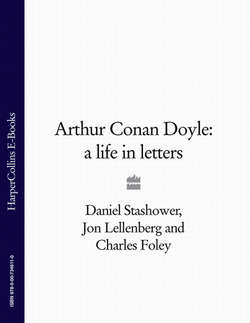Читать книгу Arthur Conan Doyle: A Life in Letters - Daniel Stashower, Исмаил Шихлы - Страница 70
to Mary Doyle STONYHURST, JUNE 1874
ОглавлениеI am glad to hear that you are rusticating down at Joppa. I hope you all enjoy yourselves and have as fine weather as I have. On Shrove monday we played the match, and we won a glorious victory. They got 111 runs and we got 276, of which I contributed 51. When I reside at Edinburgh, I would like to enter some cricket club there. It is a jolly game, and does more to make a fellow strong and healthy than all the doctor’s prescription in the world. I think I could take a place in the eleven of any club in Edinburgh, for next year I will be in the Stonyhurst eleven, and it is stronger than any of Edinburgh.
What a wonderful swimmer Tottie is, I expect to find her some sort of a mermaid, when I come home. I wonder why it is that my progress is so much slower than hers, it is not for the want of a will, I am sure, for one of my greatest ambitions is to be a good swimmer.
I am getting very rich now, what with Papa’s and uncle’s liberality. You must thank them both from me. Perhaps since I have such abundance you will send me 2/, before June the 18th. For on that day we go to Preston to see a great cricket match played there, and we will have to find our own dinners I fear.
I don’t know whether I told you last letter about my success in schools, but I got second in schools this term, and did better in every respect than last term.
Conan Doyle may not have been the poorest boy at Stonyhurst, but he was surely in the bottom drawers, even if welcome little gifts of cash from his father and one of his uncles raised him temporarily from the ranks of the truly poverty-stricken. Lack of funds would haunt him for many more years, until success as a writer finally changed not only his own circumstances, but the rest of the family’s.
Returning to Stonyhurst for his final year, Conan Doyle, now fifteen years old, knew it was time to begin thinking of the future. Although his academic performance had been impressive the previous year, some of his teachers still regarded him as a willful and not especially promising prospect. ‘One master,’ he recalled, ‘when I told him that I thought of being a civil engineer, remarked, ‘Well, Doyle, you may be an engineer, but I don’t think you will ever be a civil one.’ Another assured me that I would never do any good in the world, and perhaps from his point of view his prophecy has been justified.’
